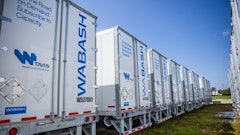According to Peter Quantrill, director general of the British International Freight Association (BIFA), it was “hardly surprising” to hear the recent news that the U.S. has delayed new rules requiring all cargo containers entering the U.S. to be security scanned prior to departure from overseas for two more years, amid questions over whether this is the best way to protect US ports.
Quantrill commented: “As BIFA has said repeatedly, the Department of Homeland Security (DHS) has consistently underestimated the enormity of the task in hand relative to the costs both to the U.S. government and foreign governments, as well as, importantly, the limited ability of contemporary screening technology to penetrate dense cargo, or large quantities of cargo in shipping containers.”
BIFA’s comments are in response to the recent news of a letter from Thomas Carper, chairman of the Senate Committee on Homeland Security and Governmental Affairs, which suggested that the use of systems available to scan containers would have a negative impact on trade capacity and the flow of cargo.
Quantrill added: “Media reports suggest that the U.S. government now doubts whether it would be able to implement the mandate of 100 percent scanning, even in the long term, and it would appear that it now shares BIFA’s long-standing opinion that it is not the best use of taxpayer resources to meet the U.S.’s port security and homeland security needs.
"We have always said that expanding screening with available technology would slow the flow of commerce and drive up costs to consumers without bringing significant security benefits.
“Whilst the latest news of a two-year delay appears to be a healthy dose of common sense at the U.S. Department of Homeland Security, BIFA still believes that the U.S. government ought to take an even bolder step and repeal the original legislation.
“That would be the most appropriate way to address this flawed provision and allow the department and the industry to continue to focus on real solutions, including strengthened risk-based management systems to address any security gaps that remain in global supply chains.”


















